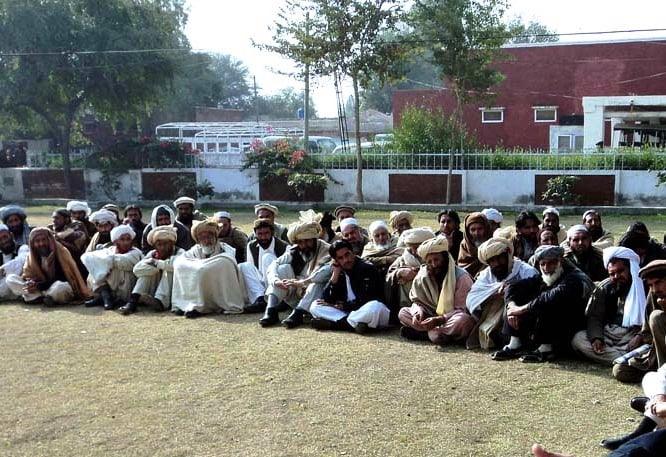After so many deliberations and weeks of discussions, an important milestone for peace was achieved in Kurram today with the conclusion of a Grand Jirga held in Kohat, when both parties involved in the negotiations signed a peace agreement, marking a crucial step towards stability in the region. .
Announcing the development, KP government spokesperson Barrister Muhammad Ali Saif revealed that one of the warring parties had signed the peace agreement a few days ago, while the other party signed it today.
Lawyer Saif confirmed that both sides had agreed to surrender their weapons and demolish their bunkers.
He stated that the peace agreement would usher in a “new era of peace and development” for the district, stressing that calm and security would soon be restored to the once restive region.
According to Express News, the three-week long Jirga concluded today under the supervision of Kohat Division Commissioner Moatasim Billah Shah. The agreement means mutual cooperation between the parties, the government and the local administration to ensure lasting peace in Kurram.
As part of the peace agreement, both sides have committed to dismantling private bunkers in Kurram and collecting weapons. Additionally, the government has agreed to open access to Kurram once peace is established.
In a proactive measure, the government plans to set up a 399-member task force to safeguard the routes leading to Kurram. This force will have the task of guaranteeing security in the region.
The formal announcement of the Kurram Peace Agreement will take place at the Governor House in Peshawar, and both sides are bound by the decisions taken during the Apex Committee meetings.
Sources have confirmed that one of the parties had already signed the peace agreement earlier, while the second party requested additional time for consultations and finally signed the agreement today.
During today’s Jirga, it was also decided that the decisions taken during the Apex Committee meeting in Peshawar would be implemented. If any of the parties had any concerns, they were advised to approach the Kohat Commissioner or the Divisional Commissioner so that the government could address the concerns promptly.
The parties had until February 1 to implement the agreement. Within a month, both sides must dismantle their bunkers, previously built for attacks against the other side, and hand over their weapons to the provincial government.
The sources mentioned that the bunkers and weapons will be dismantled and collected under the supervision of the administration. The one-month deadline was set to ensure that neither party claimed there was insufficient time to comply.
The Jirga also discussed what would happen if one side did not hand over its weapons. Just a day earlier, the issue had been debated in the Khyber Pakhtunkhwa (KP) Assembly, where members strongly opposed any military operation. However, during today’s Jirga it was agreed that both sides would hand over their weapons, avoiding the need for an operation.
According to our correspondent, the roads leading to Kurram will remain closed until peace is firmly established. If the parties do not hand over their weapons and dismantle their bunkers, road closures will persist.
However, the provincial government has maintained a helicopter service to provide essential medical and food supplies. Once peace is ensured, all roads to Kurram will be reopened.
Earlier, a persistent deadlock had prevented the Grand Jirga from finalizing the peace deal as protests against road closures in the district continued for the ninth consecutive day.
The agreement could not be signed due to lack of attendance by the members of the Jirga. According to sources, while both sides had agreed on many points of the agreement, one of them had reservations about a clause requiring the deposition of heavy weapons in the hands of tribal elders.
During the Jirga several points were discussed and one of the parties suggested that both sides should present weapons to the government. However, authorities made it clear to Jirga members that the government would not risk opening the roads unless the heavy weapons were handed over first.
This stalemate sparked protests in several parts of the country, particularly in Karachi, where roadblocks and traffic jams disrupted the daily lives of residents.
The protests were fueled by the continued closure of key routes, including the main Parachinar-Peshawar highway, which had been closed for two and a half months, halting all supplies to Upper Kurram.
It is important to note that the dispute in Kurram is over land that both sides have claimed ownership of for more than a century. Over time, several issues have added to the complexity of the situation, further intensifying the conflict.




